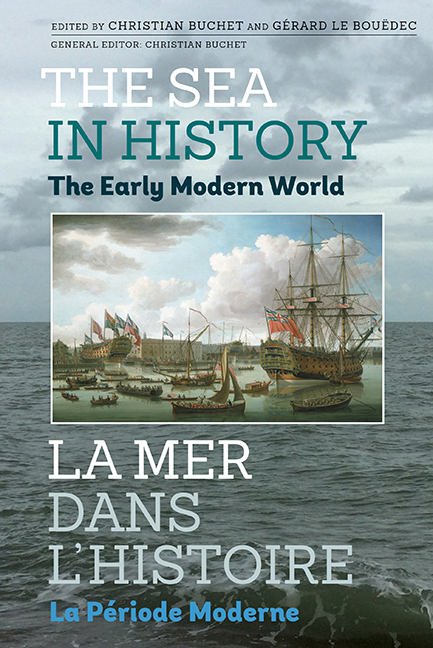Book contents
- Frontmatter
- Contents
- List of Illustrations
- List of Contributors
- Introduction générale et remerciements par
- General introduction and acknowledgements
- Introduction (français)
- Introduction (English)
- LA RÉUSSITE PAR LA MER:La reussite par la mer des territoires et des communautés littorales
- La construction d'un espace mondial: La circulation maritime et les ports
- Les dynamiques des circulations maritimes au XVIIIe siècle entre paix et guerre: ports, circuits, flottes entre logiques étatiques et logiques marchandes
- The European seaport system at the beginning of the early modern age
- Port location and development in the British Atlantic World in the seventeenth and eighteenth centuries
- Mutations et recompositions des flottes marchandes en Méditerranée
- Indian ports and European powers
- African Atlantic ports and trade fleets
- Les ports du Maghreb à l'époque moderne
- La forte croissance de l'économie des pêches et des échanges
- Les acteurs de la dynamique maritime
- LA PUISSANCE MARITIME INSTRUMENT DE LA PUISSANCE POLITIQUE ET D'UNE STRATÉGIE GLOBALE DE RAYONNEMENT VOIRE DE DOMINATION: Les puissances maritimes occidentales
- L'océan Indien, entre convoitises et indifférences
- Les puissances maritimes asiatiques
- L'Afrique
- La politique maritime et l'idéologie
- Mer et développement technologique
- Développement maritime et maîtrise économique et financière
- Développement maritime et maîtrise organisationnelle
- Conclusion (français)
- Conclusion (English)
- Conclusion générale par
- General conclusion by
- Miscellaneous Endmatter
- Miscellaneous Endmatter
The European seaport system at the beginning of the early modern age
from La construction d'un espace mondial: La circulation maritime et les ports
Published online by Cambridge University Press: 11 May 2017
- Frontmatter
- Contents
- List of Illustrations
- List of Contributors
- Introduction générale et remerciements par
- General introduction and acknowledgements
- Introduction (français)
- Introduction (English)
- LA RÉUSSITE PAR LA MER:La reussite par la mer des territoires et des communautés littorales
- La construction d'un espace mondial: La circulation maritime et les ports
- Les dynamiques des circulations maritimes au XVIIIe siècle entre paix et guerre: ports, circuits, flottes entre logiques étatiques et logiques marchandes
- The European seaport system at the beginning of the early modern age
- Port location and development in the British Atlantic World in the seventeenth and eighteenth centuries
- Mutations et recompositions des flottes marchandes en Méditerranée
- Indian ports and European powers
- African Atlantic ports and trade fleets
- Les ports du Maghreb à l'époque moderne
- La forte croissance de l'économie des pêches et des échanges
- Les acteurs de la dynamique maritime
- LA PUISSANCE MARITIME INSTRUMENT DE LA PUISSANCE POLITIQUE ET D'UNE STRATÉGIE GLOBALE DE RAYONNEMENT VOIRE DE DOMINATION: Les puissances maritimes occidentales
- L'océan Indien, entre convoitises et indifférences
- Les puissances maritimes asiatiques
- L'Afrique
- La politique maritime et l'idéologie
- Mer et développement technologique
- Développement maritime et maîtrise économique et financière
- Développement maritime et maîtrise organisationnelle
- Conclusion (français)
- Conclusion (English)
- Conclusion générale par
- General conclusion by
- Miscellaneous Endmatter
- Miscellaneous Endmatter
Summary
ABSTRACT. Traditionally, the historiography of European seaports defines hierarchies that emphasize the prominence of the Iberian seaports (Lisbon and Seville), during the 15th and 16th centuries, while their leading positions declined during the 17th and the 18th centuries in favour of Amsterdam or London. All of them were capitals of colonial empires or emporiums. While recognizing the rationale of this analysis, this contribution tries to underline that those hierarchies are not unquestionable, and the centrality of certain major colonial hubs frequently depended on the services provided by medium and small seaports. These supplied crews, merchant fleets, shipbuilding industries and labour force, thus guaranteeing the viability of the major seaports as political, economic, financial and merchant hubs. In view of this analysis, the complementarity of seaports is an essential conceptual tool. Additionally, an analysis centred on economic networks, focused on economic agents and their entrepreneurial activities, rather than on central power policies, reveals a more dynamic and complex structure of analysis which can enrich and revise traditional perspectives of seaport hierarchies during the Early Modern Age.
RÉSUMÉ. L'historiographie des ports maritimes européens insiste sur l'importance des ports ibériens, tels Lisbonne et Séville, pendant les XVe et XVIe siècles, autant que pendant les XVIIe et XVIIIe siècles. Leur importance déclinait lors de l'émergence de Londres et Amsterdam. Ils étaient tous des villes capitales des empires coloniaux. La présente analyse veut démontrer la centralité de quelques-uns de ces ports qui dépendaient souvent des services apportés par des ports de petite ou bien moyenne envergure. En mettant à la disposition des plus grands, des équipages, flottes commerciales, chantiers navals, et forces ouvrières, ils rendaient possible le maintien des grands ports comme centres politiques, économiques, financiers, et commerciaux. D'après cette analyse, la complémentarité des ports devient un instrument analytique central. De plus, une analyse centrée sur les réseaux économiques, leurs acteurs et leurs activités d'entreprise, et pas seulement sur les pouvoirs centraux, révèle une structure plus complexe et dynamique. Il pourra enrichir et parfois réviser les perspectives traditionnelles sur les ports maritimes pendant l'époque moderne.
During the Early Modern Age, maritime circuits and port cities became the perfect interface in which different networks, economic systems, institutional set-ups and political power games were played.
- Type
- Chapter
- Information
- The Sea in History - The Early Modern World , pp. 148 - 157Publisher: Boydell & BrewerPrint publication year: 2017



